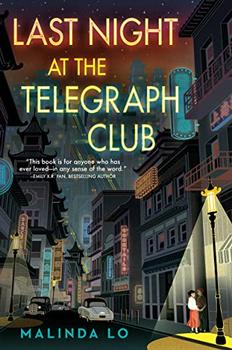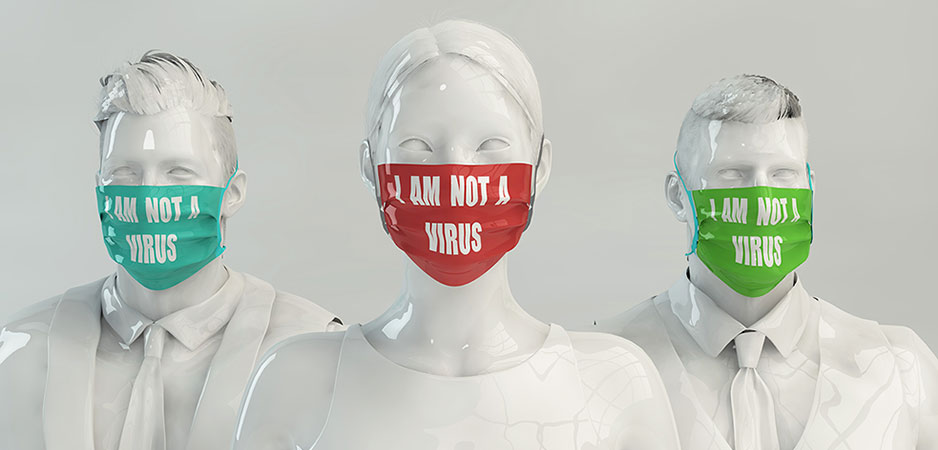Summary | Excerpt | Reading Guide | Reviews | Beyond the Book | Read-Alikes | Genres & Themes | Author Bio

Critics' Opinion:
Readers' Opinion:
First Published:
Jan 2021, 416 pages
Paperback:
Dec 2021, 432 pages
 Book Reviewed by:
Book Reviewed by:
Michelle Anya Anjirbag
Buy This Book
This article relates to Last Night at the Telegraph Club
 In Last Night at the Telegraph Club, some of the pressure that Lily faces in her family life is related to their precarious situation as immigrants, specifically as Chinese immigrants in the aftermath of the anti-communist hysteria of McCarthyism. Chinese immigrants have a long, often obscured history in the United States, which includes several exclusion acts that were essentially part of a strategy to keep U.S. immigration, and the country's citizenry, of white, European descent. Despite the gradual repeal of these measures, Sinophobia, or Anti-Chinese sentiment and racism, was prevalent in the U.S. at the time the book is set, and it still persists today, as has been made more openly apparent by some of the national discourse during the COVID-19 pandemic.
In Last Night at the Telegraph Club, some of the pressure that Lily faces in her family life is related to their precarious situation as immigrants, specifically as Chinese immigrants in the aftermath of the anti-communist hysteria of McCarthyism. Chinese immigrants have a long, often obscured history in the United States, which includes several exclusion acts that were essentially part of a strategy to keep U.S. immigration, and the country's citizenry, of white, European descent. Despite the gradual repeal of these measures, Sinophobia, or Anti-Chinese sentiment and racism, was prevalent in the U.S. at the time the book is set, and it still persists today, as has been made more openly apparent by some of the national discourse during the COVID-19 pandemic.
In the 1950s, Senator Joseph McCarthy became a prominent voice of anti-communist sentiment as the Cold War persisted. His Red Scare tactics included assertions that the U.S. had been infiltrated by foreign agents who intended to subvert both the fabric of society and the federal government. Accusations flew, with government representatives, Hollywood elite and ordinary citizens alike being reported as communists or communist sympathizers. Individuals from communist or communist-leaning countries, such as China, were considered especially suspect. However, the idea that East Asian cultures posed an existential threat to "Western" ways of life — often called "the yellow peril" — had been part of the American imaginary since the 19th century.
This is the situation Lily's family would have been facing. When her father's citizenship papers are confiscated by the FBI, Lily's mother remarks, "They are looking for scapegoats…They're using these investigations as an excuse to deport Chinese." The threat hangs doubly for Lily, who is not only Chinese American but also discovering her sexuality and becoming involved in San Francisco's underground lesbian subculture. McCarthy and his followers also propagated anti-LGBTQ+ sentiment, equating homosexuality with communism.
Despite the gains made in the Civil Rights Movement, Sinophobia persists in the United States. China's rise to a global superpower has led to a polarized relationship in which the two countries are often positioned as antithetical to each other. Donald Trump's 2016 presidential campaign and subsequent administration kicked off an uptick in anti-Chinese sentiment through trade wars, harsh rhetoric and increased visa restrictions and revocations on Chinese national scholars and students. Sinophobia was compounded in 2020 by Trump's rhetoric (repeated by his followers) about COVID-19, which he called the "Chinese virus," "Wuhan virus," "Wuflu," "Kung Flu," and other slurs implicating those of Chinese descent as culpable in its spread. Organizations like Human Rights Watch have linked such statements and attitudes to a worldwide increase in Anti-Asian racism, xenophobia and violence.
There has been a recent spate of crimes against Asian American elders in particular, with many incidents reported in the Bay Area where Malinda Lo's novel is set. If you want to help deter crimes like these and/or donate to the victims or community organizations that badly need support, check out the list of resources in this article from Bustle.
In the contemporary United States, Lily's dream of working on rocket development in Last Night at the Telegraph Club might be more easily attainable and she might feel more comfortable about being queer, but her Chinese identity and heritage would still be a source of tension and marginalization
Anti-Sinophobia masks, courtesy of Kentoh/Shutterstock
Filed under Society and Politics
![]() This "beyond the book article" relates to Last Night at the Telegraph Club. It originally ran in February 2021 and has been updated for the
December 2021 paperback edition.
Go to magazine.
This "beyond the book article" relates to Last Night at the Telegraph Club. It originally ran in February 2021 and has been updated for the
December 2021 paperback edition.
Go to magazine.





The House on Biscayne Bay
by Chanel Cleeton
As death stalks a gothic mansion in Miami, the lives of two women intertwine as the past and present collide.

The Flower Sisters
by Michelle Collins Anderson
From the new Fannie Flagg of the Ozarks, a richly-woven story of family, forgiveness, and reinvention.

The Funeral Cryer by Wenyan Lu
Debut novelist Wenyan Lu brings us this witty yet profound story about one woman's midlife reawakening in contemporary rural China.
Your guide toexceptional books
BookBrowse seeks out and recommends the best in contemporary fiction and nonfiction—books that not only engage and entertain but also deepen our understanding of ourselves and the world around us.